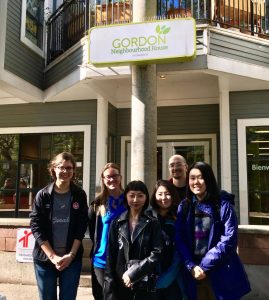All Good Things Come to an End…
Sophocles has a famous quote that goes, “There is no success without hardship.” This quote could not be closer to the truth! While we had a wonderful experience at the Gordon Neighbourhood House, obtained results and learned some gardening skills, it was not without some obstacles and speed bumps along the way. In this blog post, we will detail these problems and the actions we will take in the future because of this experience.
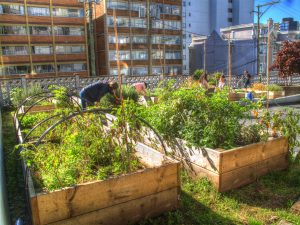
What?
In the last three months, six of us from different majors in LFS worked collaboratively to address the knowledge gaps in current urban farming studies. We did this by qualitatively determining the social community-building aspect of Urban Agriculture (UA) with regards to community development and community food security. The emotion graph that we drew in tutorial class on November 1 reflected the rollercoaster of our emotions. Most of our emotions rose dramatically when we attended the farming sessions and the community lunch program while the emotions decreased by the time we worked on our proposal. Overall, the emotions trend went up as the project went well and everyone was on the same track.
One big challenge that we faced in this project was the insufficient number of survey response from previous farming volunteers at GNH. As part of our project to measure the impact of UA, we were hoping to collect qualitative data and some stories to share about UA from the volunteer survey feedback. According to the 2017 coordinator log provided by our community partner, there were 44 people that have volunteered in the farm in 2017, but the number of responses was much lower than our expectations as we only received 9 responses. It was possible that the previous volunteers did not see the email to fill out our online survey. In addition, the previous volunteers could have felt discouraged to participate in the survey due to the gap between the time they volunteered and their volunteer experience. However, we were able to conduct some informal interviews and obtain observations from 6 other volunteers during our farming sessions, gathering their reflections and stories on urban farming programs.
At the start of our project, we were planning on conducting interviews and taking observations on other community members who participate in GNH’s community activities such as the community lunch visitors, mobile produce market and food markets. However, as we proceeded with the project, we realised that we would not have the time to formally conduct interviews with the other stakeholders. This resulted in us focusing mostly on urban farming program volunteers, narrowing the scope of our project. This was a little saddening and we felt disheartened that we had to downscale our project.
So what?
One of the things we learned from this project is how hard it is to conduct interviews and how to conduct them effectively. We had difficulty trying to get an adequate amount of responses to the online survey from the current and previous volunteers. Not only that, we had a hard time trying to interview people attending the GNH community lunches which eventually became one of the reasons why we did not conduct interviews with the other stakeholders. We originally thought about interviewing people while they are waiting fo for their meals to arrive at the community lunch. However, what happened was that we found it hard to casually ask questions or make conversations because they were engaged in a conversation with the other community members and also due to not knowing how to initiate conversation in such a way to include interview questions. This is something we could have done differently to effectively collect more qualitative data from wider range of community members. First of all, we could have done a better job by setting up a date to conduct a more formal interview with the people who came to GNH for lunch. Another thing we could have done was to make a questionnaire on paper to be filled out by the lunch participants. It would have been less disruptive and would be more comfortable way of gathering data.
However, what was most important was probably to come up with a way to solve the difficulty we were facing collectively as a group. There were times we felt that group communication and discussions were lacking due to the difficulty in meeting up as a group outside of the class. Perhaps we should have tried to make a time to meet as a group to talk about our project to solve problems together. It is stated in “Communication in the Real World: An Introduction to Communication Studies” (2016) that problem solving as a group may take more time and could be burdensome, but there are great benefits. An effective decision making or problem solving as a group is based on a shared understanding of problem through discussions. This shared knowledge is would be more in depth and complex that that developed by an individual because of the exposure to different viewpoints and broadening of perspectives. Moreover, there could have been a greater benefit due to the diverse backgrounds of our group members. Going back to the early part of the LFS 350, we have learnt that diversity in a group can facilitate better discussion and foster creativity (Philips, 2014). So imagine what we could have come up with if we tried harder to work more collaboratively as a group?
Now what?
From this project, we can now apply the shortcomings we experienced to future projects. For one, we learned how hard it is to get survey responses and to conduct in-person interviews. If we were to do this in the future, we will have to prepare more beforehand and perhaps have some kind of incentive for online surveys if it is possible or ethical to do so. For instance, we could say you will be entered in a chance to win a gift card or voucher after completing this survey. Another important aspect of group work is communication. A way we can improve is to have regular communication and respond quickly to any messages received. This is because when one person’s message is left hanging, that can discourage them from communicating within the group. Hopefully, the group after us can also use this knowledge and be more well-prepared for this aspect of their project.
Overall, from the results we obtained, we found that community-based urban farming connected participants with each other and made them feel a sense of belonging to the West End community. In addition, they were more confident about growing and harvesting vegetables as they all gained gardening skills to varying degrees. Also, this was an achievement for all of our group members. Beforehand, most of us rarely had a chance to farm or garden. Hence, we as all satisfied and grateful to get our hands dirty and obtain knowledge through this experience. We look forward to presenting our findings to a large audience at the student Nest. Maybe from our presentation, at least one person will try out urban farming!
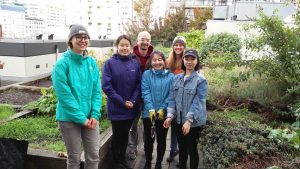
References
Communication in the Real World: An Introduction to Communication Studies. (2016, September 29). Retrieved November 25, 2017, from http://open.lib.umn.edu/communication/chapter/14-3-problem-solving-and-decision-making-in-groups/
Phillips, K. W. (2014). How Diversity Makes Us Smarter. Retrieved November 25, 2017, from http://www.scientificamerican.com/article/how-diversity-makes-us-smarter/

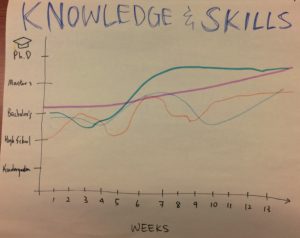
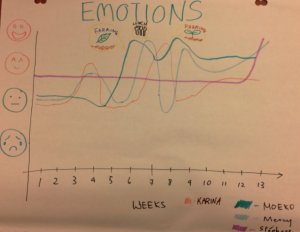
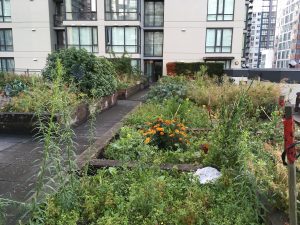
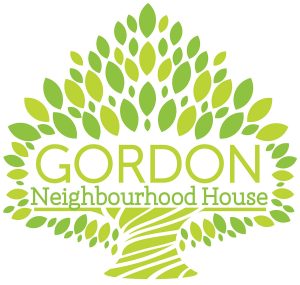 The Gordon Neighbourhood House (GNH) is a community gathering place for West End residents since 1942 and has a food philosophy revolving strongly around the concept of community food security and a dignified right for everyone to have access to healthy, affordable food. Community food security is defined in our LFS 350 course notes as “all individuals in a community having access to affordable, safe, culturally appropriate, ecologically responsible and nutritionally adequate food at all times.”,
The Gordon Neighbourhood House (GNH) is a community gathering place for West End residents since 1942 and has a food philosophy revolving strongly around the concept of community food security and a dignified right for everyone to have access to healthy, affordable food. Community food security is defined in our LFS 350 course notes as “all individuals in a community having access to affordable, safe, culturally appropriate, ecologically responsible and nutritionally adequate food at all times.”,